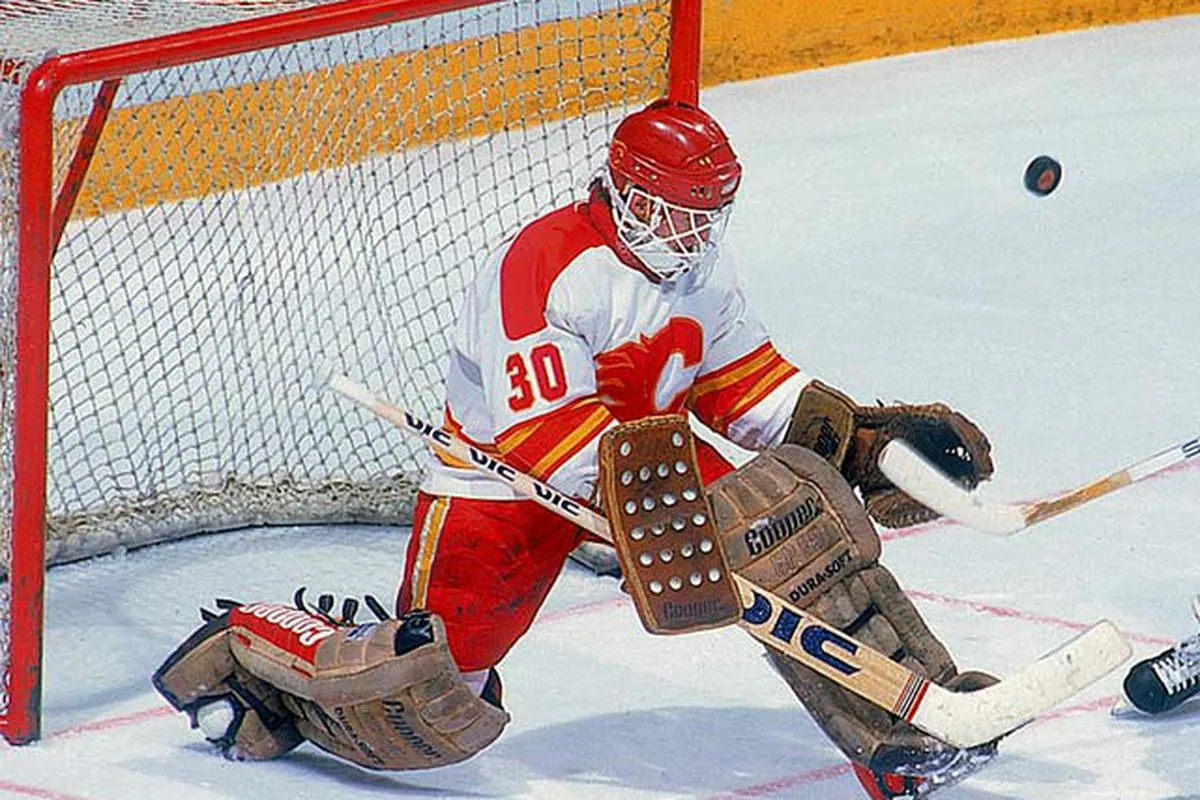Nation Sites
The Nation Network
FlamesNation has no direct affiliation to the Calgary Flames, Calgary Sports and Entertainment, NHL, or NHLPA
The Hall of Fame case for Mike Vernon

It’s that time of year, folks. While the ongoing COVID-19 pandemic has thrown everyone’s lives and plans into disarray, there’s one thing that hasn’t been disrupted: the annual Hockey Hall of Fame deliberations. The 18 members of the induction committee will have their 2020 selections announced on Wednesday afternoon.
Let’s make the case for a few former Calgary Flames. First up is Mike Vernon.
The case for Vernon
Born and raised in Calgary, Vernon’s career was pretty storybook in a lot of ways. He played for the Wranglers, got drafted by the Flames, became the starter and made two trips to the Stanley Cup Final (winning in 1989). Then he headed to Detroit, where he made two more trips to the Final (winning again). He rejoined the Flames in 2000 and played a couple seasons before retiring as a Flame. His #30 was the second jersey number retired by the club.
In terms of numbers, Vernon played 782 NHL games and amassed a 385-274-92 record over 19 seasons with Calgary, Detroit, San Jose and Florida. He had a career .889 save percentage and 3.00 goals against average with 27 shutouts. He led the NHL in shutouts once.
He’s 16th in regular season wins. The players ahead of him are Martin Brodeur (in), Patrick Roy (in), Roberto Luongo (not eligible yet), Ed Belfour (in), Marc-Andre Fleury (active), Henrik Lundqvist (active), Curtis Joseph, Terry Sawchuk (in), Jacques Plante (in), Tony Esposite (in), Glenn Hall (in), Grant Fuhr (in), Chris Osgood, Dominik Hasek (in) and Ryan Miller.
While he never won a Vezina (he finished second in voting in 1988-89), he won the Jennings in 1995-96 and Conn Smythe in 1996-97. Team-wise, Vernon had Stanley Cup wins in 1989 and 1997 and a Memorial Cup in 1983. He played in four Stanley Cup Finals split across two teams and two decades.
Vernon had success as a amateur and he was a great pro with individual and team success, along with longevity.
The case against Vernon
Nobody’s going to argue that Vernon sucked. He was obviously very good. But a case can be made that he was on a pair of very good teams and so his individual impact was muted. Wins and trophies were all team accomplishments and so it’s difficult to fully isolate Vernon’s impact. He was always one of the best goaltenders in the NHL, but there wasn’t a definitive person where he was the best.
Also, in part because of the era (and the differences in playing style and equipment), Vernon’s numbers don’t compare extremely well historically. His wins are excellent, but his goals against, save percentage and shutouts are historically very ordinary compared to other prominent (more recent) goalies.
He also didn’t have a massive international resume, but a decent amount of that was because he was always in the playoffs rather than playing in the World Championships.
Era comparisons
There were four very prominent goalies who won a ton throughout the 1980s and 1990s: Vernon, Grant Fuhr, Billy Smith and Patrick Roy.
Let’s compare their regular season stats.
GP | W (%) | SO (%) | SV% | GAA | |
Vernon | 782 | 385 (49.2%) | 27 (3.4%) | .889 | 3.00 |
Fuhr | 868 | 403 (46.4%) | 25 (2.9%) | .887 | 3.38 |
Smith | 680 | 305 (44.8%) | 22 (3.2%) | .894 | 3.17 |
Roy | 1029 | 551 (53.5%) | 66 (6.4%) | .910 | 2.54 |
Fuhr, Smith and Roy are all in the Hall. Roy was a flat-out excellent goalie with the numbers and trophies to prove it. Vernon has better regular season numbers than Fuhr and Smith, but they have more Stanley Cups (each with four to his two) and each has a Vezina. If you want to argue the trio are all equally good, I’m sympathetic to that argument because I don’t know how much of their success to attribute to being on powerhouse Oilers and Islanders teams.
It’s tough to get into the Hall as a goalie. But relative to his era-specific counterparts who are already in, Vernon compares extremely well.
Breaking News
- Flames Prospect Roundup: How the standings shape up entering the holiday break
- NHL Notebook: Sidney Crosby takes sole possession of most points in Penguins’ franchise history
- FlamesNation Mailbag: Waiting for Santa with reader questions
- Flames injury news: positive signs for Martin Pospisil
- Recap: Martin Frk leads Wranglers to memorable Winter Wranglerfest win in more ways than one
